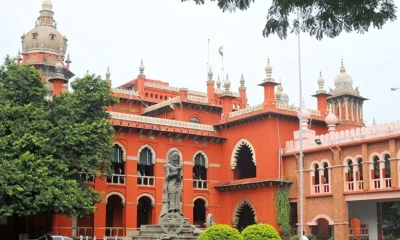Edited by Deepali Verma
The Madras High Court has instructed the Tamil Nadu Government to not allow non-Hindus inside Hindu temples beyond the kodimaram or the flagpole area across the state unless they profess faith in the deity and agree to abide by Hindu customs.
The judgement given by Justice S Srimathy of the Madras HC’s Madurai Bench was in response to a petition by D Senthilkumar, a toy shop owner at the foothills of Dhandayuthapani Swamy Temple in Dindigul district’s Palani.
In his petition, Senthilkumar said that non-Hindus often treated temples like tourist spots and in turn disrespecting the sanctity of the Hindu faith. Incidents cited were of non-Hindus consuming non-vegetarian food within the temple premises and offering prayers from other religions. This raises concerns among Hindu devotees about the erosion of their religious spaces.
In an address to these concerns, Justice Srimathy, remarked that temples are not tourist attractions but rather sacred spaces that deserve reverence. The justice ordered the installation of boards at temple entrances that cite the restriction on non-Hindu entry beyond the kodimaram. This measure is brought into force to uphold the sanctity of Hindu temples as well as respect the religious sentiments of the Hindu community, she said.
Additionally, the order said the records of such undertakings should be maintained in a register by the temple, and temples are required to adhere to traditional rituals and practices (agamas) strictly.
The court’s decision ensures the sanctity of Hindu temples while also leaving room for non-Hindu devotees who respect and wish to follow Hindu traditions.
The Tamil Nadu government mirroring a secular viewpoint, argued that restricting entry to non-Hindus who believe in the deity could hurt their religious sentiments and contravene their constitutional rights. However, the Madras High Court countered that the state’s concern for the sentiments of non-Hindus overshadowed the need to safeguard the Hindu religious practices.
Justice Srimathy’s ruling goes beyond the Palani temple and applies to all Hindu temples in Tamil Nadu. She emphasised on the directive being necessary to maintain communal harmony and societal peace. The court’s decision represents an effort to balance the preservation of Hindu religious practices and temple sanctity while accommodating the non-Hindu devotees who adhere to Hindu traditions.
The court ordered critical remarks against Tamil Nadu’s Hindu Religious and Charitable Endowments Department (HR&CE) for not taking appropriate steps to prevent such incidents.
The court order that placed a conditional restriction on the entry of non-Hindus into temples, did so in the wake of numerous instances mentioned in the petition such as non-Hindus purchasing tickets at the Winch Station in Pazhani to visit the temple hilltop. The petition, keeping in mind a similar incident, said when the ticket issuing authority at the temple had to question the evident attire of non-Hindus and refused to issue tickets, a man in the group argued with the employees that “this is a tourist place” and informed that there were no boards to restrict non-Hindus.

















